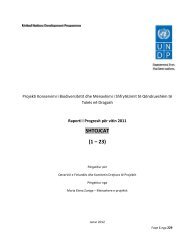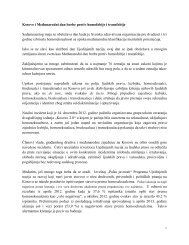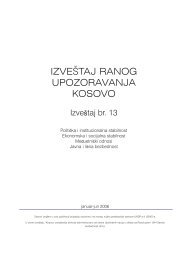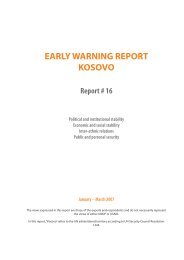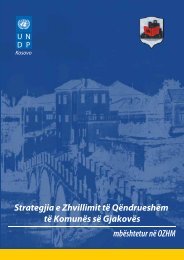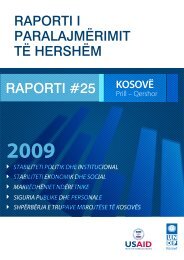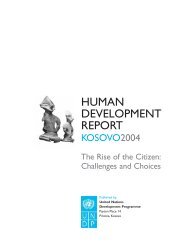Kosovo Human Development Report 2010 - UNDP Kosovo - United ...
Kosovo Human Development Report 2010 - UNDP Kosovo - United ...
Kosovo Human Development Report 2010 - UNDP Kosovo - United ...
You also want an ePaper? Increase the reach of your titles
YUMPU automatically turns print PDFs into web optimized ePapers that Google loves.
socially excluded groups cannot necessarily<br />
enjoy equally the benefits of<br />
such opportunity. When deprivation is<br />
prolonged throughout the lifespan of<br />
individuals or groups, it can result in an<br />
intergenerational transfer of exclusion.<br />
The transfer of exclusion is sustained<br />
by continued external and internal<br />
shocks, thus making it difficult for existing<br />
generations to provide better<br />
opportunities for the next generations.<br />
I have completed several computer<br />
courses in hardware and fixing computers.<br />
I have applied for a position<br />
but they haven’t even called me for the<br />
test, and I was told that since I am a<br />
woman I may not understand much<br />
about these things and thus may not<br />
be able to do the job.<br />
1.3<br />
Youth participant of a focus<br />
group<br />
Linkages between<br />
human development<br />
and social inclusion<br />
<strong>Human</strong> development and social exclusion<br />
are two complementary concepts.<br />
Both focus on equitable human<br />
opportunity as a measure of social<br />
progress and human capacity as the<br />
primary engine of progress. From the<br />
human development point of view,<br />
social inclusion is the process and outcome<br />
linked to the full spectrum of<br />
human fulfillment. If the objective of<br />
development is to create an enabling<br />
environment for people to enjoy long,<br />
healthy and fruitful lives, exclusion<br />
can hamper choices and opportunities.<br />
<strong>Human</strong> development cannot take<br />
place in a context of social exclusion.<br />
The human development paradigm,<br />
founded in 1990 (by Mahbub ul Haq,<br />
Amartya Sen, Francis Stewart and Paul<br />
Streeten) and promoted through the<br />
<strong>UNDP</strong> <strong>Human</strong> <strong>Development</strong> <strong>Report</strong>s,<br />
sets itself apart from previous development<br />
theories by arguing that economic<br />
growth does not automatically<br />
trickle down to improving people’s<br />
well-being. The concept of human<br />
development proceeds from the perspective<br />
of the individual. It incorporates<br />
the language of “capabilities” to<br />
assert that each individual, by virtue of<br />
his or her existence, has a moral right to<br />
develop his or her inherent capacities<br />
(intellectual, physical, social) to the fullest<br />
extent possible and to exercise the<br />
greatest possible freedom of choice in<br />
shaping his or her own life within their<br />
society.<br />
The human development concept<br />
thus advocates putting people at the<br />
centre, as both the means and end of<br />
development. The goal of development<br />
is therefore defined as the expansion<br />
of human choices, freedoms<br />
and capabilities. 24<br />
Through this approach, human development<br />
emphasizes the “agency” of<br />
people themselves. It seeks to improve<br />
human lives in the sense of wellbeing<br />
and freedom and also to realize human<br />
capacity to radically change and<br />
improve societies. <strong>Human</strong> development<br />
thus emphasizes two simultaneous<br />
processes: 1) formation of human<br />
capabilities as an explicit development<br />
objective; and 2) the use people make<br />
of their acquired capabilities to fulfil<br />
their life goals and potential. It promotes<br />
the idea that human action and<br />
initiative is itself central to removing<br />
obstacles to human development.<br />
By emphasizing the diversity of human<br />
needs, human development was<br />
thus conceived as an alternative to<br />
traditional policy prescriptions – such<br />
as the neo-liberal Washington Con-<br />
SOCIAL INCLUSION AND HUMAN DEVELOPMENT - A CONCEPTUAL BACKGROUND<br />
| 27




